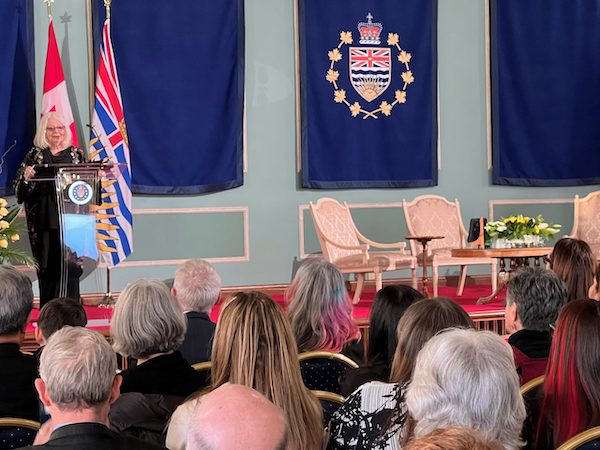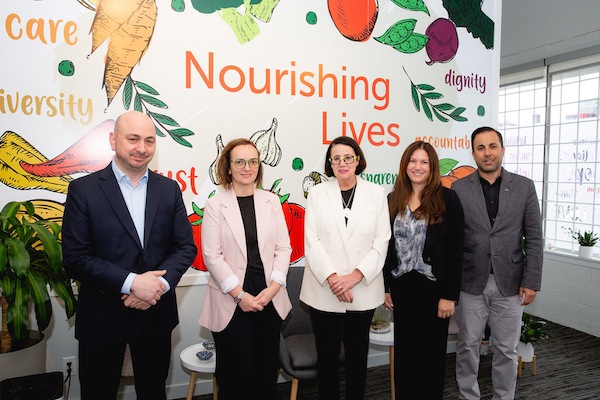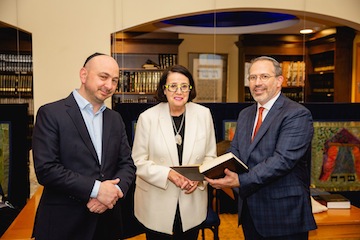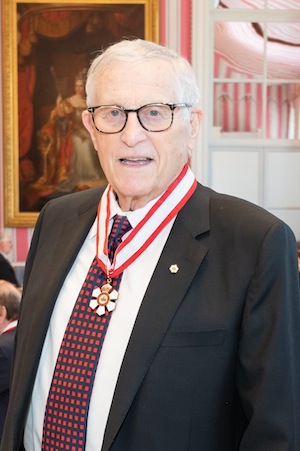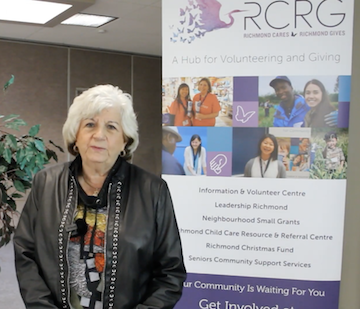Lillian Boraks-Nemetz speaks at Government House on Jan. 19. (photo from ltgov.bc.ca)
On Jan. 19, Lillian Boraks-Nemetz received a standing ovation for her speech at an event hosted by the lieutenant governor of British Columbia, Janet Austin, at Government House in Victoria.
In a mere 12 minutes, Boraks-Nemetz took the audience through the horrors she suffered during the Holocaust: the rise of anti-Jewish laws, the killing of her younger sister, the escape from the Warsaw Ghetto, the separation of family and the loss of identity – each with its own devastating consequences. She also spoke about the trauma that accompanied her after moving to Canada.
She began by quoting the words of Janusz Korczak, the Polish doctor, educator and head of an orphanage in Warsaw, who was killed with his charges at Treblinka in 1942. He wrote, “the well-being of a country is as good as the well-being of its children.”
To that quote, Boraks-Nemetz added, “When you look around, it seems that the world itself is not in good standing on this issue. I know this to be true as a childhood witness of the Holocaust and as an adult witnessing the present lives of strife for many children in various countries: fighting wars, poverty and hunger.
“My own childhood ended the day Nazi Germany invaded Poland and World War II began. Our happy lives ended and I became an adult at the age of 6. All Jewish children were automatically sentenced to death by Hitler and the Third Reich, and I was one of them. A million and a half Jewish children were murdered in the Holocaust – among them almost all my cousins and my sweet little sister.”
Boraks-Nemetz described her experiences as both a First and Second Generation survivor. She spoke of bearing not only her legacy, but the legacies of her parents, who survived the Holocaust but were not the same parents as before, mourning the loss of their young child and other tragedies. She discussed the interval following the war to the time the barbarity of what occurred began to register.
“The hidden child gnawed at my soul wanting to get out. I chose to live for many years like a good Canadian housewife and mother, but when I reached the age of 40, all hell broke loose. I fell apart and there was no help,” Boraks-Nemetz said.
“Trauma,” she added, “leaves behind a deep wound that, when unhealed, will eventually begin to start creating an emotional pain which won’t let you cope with an ordinary life. [It’s] a pain that few understand.”
The ensuing breakup of her family, she recounted, took many years to repair. At a certain point, she was able to put the pieces back together and begin to understand the root of her pain through telling her story to students and adult groups, and through writing novels and poetry. Boraks-Nemetz is the author of several books, including The Old Brown Suitcase, Mouth of Truth and, most recently, Out of the Dark, a collection of poetry.
“I wanted to understand how the past shaped my present and, above all, I wanted to mend my relationships with my children of whom I am so proud – my Second Generation children who also bore the brunt of my pain and whose forgiveness and understanding mean more to me than life,” she concluded.
The moment Boraks-Nemetz finished speaking, the crowd rose to its feet.
Titled Reconciliation and Holocaust Remembrance: Conversations on Intergenerational Trauma and Healing in Jewish and Indigenous Communities, the evening included short presentations by Nina Krieger, executive director of the Vancouver Holocaust Education Centre, and Chief Robert Joseph, ambassador for Reconciliation Canada and a former member of the National Assembly of First Nations Elders Council.
Afterwards, Austin led a dialogue between panelists Marsha Lederman, arts correspondent for the Globe and Mail and author of Kiss the Red Stairs: The Holocaust Once Removed, and Carey Newman, a multi-disciplinary Indigenous artist, master carver, filmmaker and author. Their discussion explored experiences of healing across communities that have suffered intergenerational trauma from the Holocaust, residential schools and racism.
“I am grateful for the courage of these survivors and their children for the gift of their stories and sharing such intensely personal experiences so generously. In the pursuit of truth, we must deepen understanding and seek to connect in our hearts, to heal together,” said Austin.
“It is always my honour to sit with Holocaust and residential school survivors, as well as distinguished advocates for hope, help, healing and reconciliation. Acknowledging and addressing trauma is the key to better health and recovery. A good friend of mine once said to me: ‘We must always work together in dialogue and never compare trauma,’” said Joseph.
The Government House event was held in partnership with the Jewish Federation of Greater Vancouver, and the Jewish Federation of Victoria and Vancouver Island.
“With discrimination and racism on the rise here in B.C. and around the world, it is now more important than ever that the experiences and lessons learned from the Holocaust, residential schools and other forms of discrimination and racism remain present in the public mind so that history does not repeat itself,” said Ezra Shanken, chief executive officer of Vancouver’s Jewish Federation. “Only by learning from the past can we prevent such hatred and atrocities in the future.”
Sam Margolis has written for the Globe and Mail, the National Post, UPI and MSNBC.

